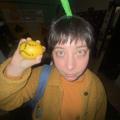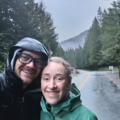I've found myself reading more Climate Fiction recently, not because I've been searching it out, I don't think, but because it's so much on everyone's mind that more is getting published. In any case, I would not have expected to enjoy it, but I've had a recent run of "climate fiction" that I would describe as optimistic. Possibly, it used to be that it felt like the urgent agenda re: The Climate was convincing everyone it was really that bad, but now it feels like the urgent agenda is convincing people that there is something to be done about it.
In any case, A Half Built Garden falls into the latter camp, but it is also a first contact story, which I am predisposed to like. In this story, the Earth is covered by autonomous but interconnected "Dandelion Networks" who work to restore Earth's ecology and strictly measure out their carbon budget. Complicating this, governments still attempts to govern, but have lost control of many of the resources they once commanded, including much of their public support. Furthermore, "the corporations" have been firewalled away on artificial islands, for their refusal to curtail their environmental impact, but still are active and engaging in trade for goods no one else can make.
Then the aliens arrive, and our heroine is in the right place at the right time carrying the right baby to get her foot in the door first as the aliens' favourite negotiator.
I like that Earth in the future is full of petty squabbles and dumb meetings, because I can believe a lot from my speculative fiction, but not that humanity has changed that much. The Dandelion networks are supposed to be utopian, but they do not require to me to believe that everyone gets along frictionlessly. One of the key technologies that permits the dandelion networks, however, is an algorithm that facilitates collaborative decision-making, upvoting and downvoting certain kinds of discussion threads to promote decisions in line with the network's declared values, and I admit this is the point where I felt the story had introduced Unobtainium to make the plot work.
I really enjoyed that big queer family structures were central to the characters' lives and even the plot. Every society had subtly or strongly different ideas of how families and genders worked, and this gave the humans and aliens different points of friction and connection, and I felt this was well done.
I enjoyed that the aliens were very alien, both biologically and socially, but also had individual personalities.
I am going to be honest that I enjoyed this book so much that I am not actually very objective about it. I loved this book. This book for me is what Becky Chambers' books are for other people.










